Machine Learning for Quantum Many-Body Systems
PI/1-100 - Theatre
Perimeter Institute for Theoretical Physics
 Machine learning techniques are rapidly being adopted into the field of quantum many-body physics, including condensed matter theory, experiment, and quantum information science. The steady increase in data being produced by highly-controlled quantum experiments brings the potential of machine learning algorithms to the forefront of scientific advancement. Particularly exciting is the prospect of using machine learning for the discovery and design of molecules, quantum materials, synthetic matter, and computers. In order to make progress, the field must address a number of fundamental questions related to the challenges of studying many-body quantum mechanics using classical computing algorithms and hardware.
Machine learning techniques are rapidly being adopted into the field of quantum many-body physics, including condensed matter theory, experiment, and quantum information science. The steady increase in data being produced by highly-controlled quantum experiments brings the potential of machine learning algorithms to the forefront of scientific advancement. Particularly exciting is the prospect of using machine learning for the discovery and design of molecules, quantum materials, synthetic matter, and computers. In order to make progress, the field must address a number of fundamental questions related to the challenges of studying many-body quantum mechanics using classical computing algorithms and hardware.
The goal of this conference is to bring together experts in computational physics, machine learning, and quantum information, to make headway on a number of related topics, including:
- Data-drive quantum state reconstruction
- Machine learning strategies for quantum error correction and quantum control
- Neural-network inspired wavefunctions
- Near-term prospects for data from quantum devices
- Machine learning for quantum algorithm discovery
Territorial Land Acknowledgement
Perimeter Institute acknowledges that it is situated on the traditional territory of the Anishinaabe, Haudenosaunee, and Neutral peoples.
Perimeter Institute is located on the Haldimand Tract. After the American Revolution, the tract was granted by the British to the Six Nations of the Grand River and the Mississaugas of the Credit First Nation as compensation for their role in the war and for the loss of their traditional lands in upstate New York. Of the 950,000 acres granted to the Haudenosaunee, less than 5 percent remains Six Nations land. Only 6,100 acres remain Mississaugas of the Credit land.
We thank the Anishinaabe, Haudenosaunee, and Neutral peoples for hosting us on their land.
